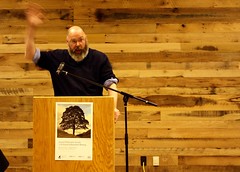
/
RSS Feed
John Lysaker, Professor of Philosophy at Emory University, commented on my book, Aristotle on the Nature of Truth, at the 2011 meeting of the Ancient Philosophy Society.
John’s comments invited me to consider more fully my ethos as an author and challenged me to articulate more fully what animates the legomenological approach. His concern, in part, is how it is determined what of the things said by one’s predecessors are deserving of response and amplification. This is an important issue, particularly if legomenology is not to become a echo chamber legitimizing one’s own previously held opinions. “How,” John asks, “does legomenology welcome interlocutors?”
I tried to perform an answer to that in my response to him, but for now, listen to John’s commentary, and particularly to the way he calls into question the propriety of my embracing Woodbridge’s language of “cooperation.” This, indeed, is a central issue; one that we discuss in more detail on episode 48 of the Digital Dialogue, which will be posted in a week or so.
To hear the other comments and my responses, click on the links below:
Here are images from the APS Book Panel:


obviously there is a lot of crossover between my responses to the book and Lysaker’s, what I don’t know is if there is something to Heidegger’s idea that ontologically responsibility is not a matter of accountability, thus my recommendation of Francois Raffoul’s The Origins of Responsibility. Looking forward to the rest of this exchange.
just started reading jane bennett’s vibrant matter which also might be of interest:
http://philosophyinatimeoferror.wordpress.com/2010/04/22/vibrant-matters-an-interview-with-jane-bennett/
One of the greatest ironies of history consisted in a question that Pontius Pilate, the Roman procurator, asked of Jesus of Nazareth. Exasperated by Jesus’ enigmatic responses, Pilate finally expressed the question “What is truth?”
This book reconsiders the traditional correspondence theory of truth, which takes truth to be a matter of correctly representing objects. Drawing Heideggerian phenomenology into dialogue with American pragmatic naturalism, Christopher P. Long undertakes a rigorous reading of Aristotle that articulates the meaning of truth as a cooperative activity between human beings and the natural world that is rooted in our endeavors to do justice to the nature of things.
When a person performs or fails to perform a morally significant action, we sometimes think that a particular kind of response is warranted. Praise and blame are perhaps the most obvious forms this reaction might take. For example, one who encounters a car accident may be regarded as worthy of praise for having saved a child from inside the burning car, or alternatively, one may be regarded as worthy of blame for not having used one’s mobile phone to call for help. To regard such agents as worthy of one of these reactions is to ascribe moral responsibility to them on the basis of what they have done or left undone.
A comprehensive theory of moral responsibility would elucidate the the concept, or idea, of moral responsibility itself?
just started reading jane bennett's vibrant matter !!!